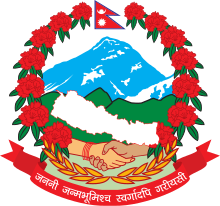Ministry of Land Management, Cooperatives and Poverty Alleviation
From Wikipedia, the free encyclopedia
The Ministry of Land Management, Cooperatives and Poverty Alleviation (Nepali: भूमि व्यवस्था,सहकारी तथा गरिबी निवारण मन्त्रालय) is a governmental ministry of Nepal responsible for land administration and management activities which ensures efficient and effective administration and sustainable management of available land resources throughout the country.[2][3] The ministry, then called Ministry of Land Reform and Management, was merged with the Ministry of Co-operatives and Poverty Alleviation to form the Ministry of Agriculture, Land Management and Cooperatives in February 2018, but was reopened and renamed as a separate ministry in August 2018 as the Ministry of Land Management, Cooperatives and Poverty Alleviation.[4]
| भूमि व्यवस्था,सहकारी तथा गरिबी निवारण मन्त्रालय | |
 | |
| Agency overview | |
|---|---|
| Formed | 1964[1] |
| Jurisdiction | Government of Nepal |
| Headquarters | Singha Durbar, Kathmandu, Nepal |
| Minister responsible |
|
| Agency executive |
|
| Website | molcpa |
History
The ministry was established in 1964 with three directorates (land reform, cooperatives and cadastral survey). One year later, three further directorates were added to its portfolio (agriculture, food and land management). In 1970, the Ministry split into the Ministry of Food and Agriculture and the Ministry of Panchayat, Home and Land Reform. The ministry received its last portfolio of Land Reform and Management in 1986. Gopal Dahit of Nepal Loktantrik Forum under the Deuba Cabinet served as the last Minister of Land Reform and Management until the ministry was dissolved in 2018 and merged into the Ministry of Agriculture, Land Management and Cooperatives following the Oli cabinet, 2018's decision to reduce the number of ministries in Nepal.[1][5][6] Due to a cabinet expansion, the Ministry of Land Management, Cooperatives and Poverty Alleviation was reopened while the agriculture-related portfolio was changed to Ministry of Agricultural and Livestock Development.[4]
Organisational structure
Four departments served under the ministry to facilitate and implement its work:[2]
- Survey Department
- Department of Land Management And Archive
- Land Management Training Centre (in Dhulikhel, Kavre)
Former Ministers of Land Reform and Management
Summarize
Perspective
This is a list of all Ministers of Land Reform and Management after the Nepalese Constituent Assembly election in 2013:
| Name | Party | Assumed office | Left office | Portfolio | |
|---|---|---|---|---|---|
| 1 | Dal Bahadur Rana[7] | Communist Party of Nepal (Unified Marxist–Leninist) | 25 February 2014 | Minister of Land Reform and Management | |
| 2 | Ram Kumar Subba[8] | Rastriya Prajatantra Party | 12 October 2015 (sworn in without portfolio) 9 November 2015 (portfolio of Land Reform and Management assigned)[9] | ||
| 3 | Bikram Pandey[10] | Rastriya Prajatantra Party | 11 August 2016 | ||
| 4 | Gopal Dahit[11] | Nepal Loktantrik Forum | 8 May 2017 | 15 February 2018 | |
| Ministry out of operation[4] | 16 March 2018[12] | 3 August 2018 | |||
| 5 | Padma Kumari Aryal[4] | Nepal Communist Party | 3 August 2018 | 25 December 2020 | Minister of Land Management, Cooperatives and Poverty Alleviation |
| 6 | Shiva Maya Tumbahamphe[4] | Nepal Communist Party | 25 December 2020 | 4 June 2021 | Minister of Land Management, Cooperatives and Poverty Alleviation |
| 7 | Laxman Lal Karna | Federal Socialist Forum, Nepal | 4 June 2021 | 22 June 2021 | Minister of Land Management, Cooperatives and Poverty Alleviation |
| 8 | Lila Nath Shrestha | CPN UML | 24 June 2021 | 12 July 2021 | Minister of Land Management, Cooperatives and Poverty Alleviation |
| 9 | Shashi Shrestha | CPN (Maoist Centre) | 8 October 2021 | 26 December 2022 | Minister of Land Management, Cooperatives and Poverty Alleviation |
| 10 | Rajendra Kumar Rai | CPN UML | 26 December 2022 | 27 February 2023 | Minister of Land Management, Cooperatives and Poverty Alleviation |
| 11 | Ranjeeta Shrestha | Nagrik Unmukti Party | 31 March 2023 | Minister of Land Management, Cooperatives and Poverty Alleviation | |
References
Wikiwand - on
Seamless Wikipedia browsing. On steroids.
